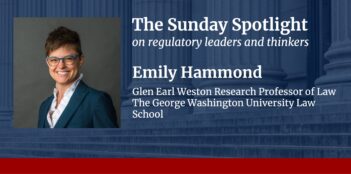
Scholar urges FERC to consider clean energy policies before approving natural gas pipelines.
Earlier this year, the Federal Energy Regulatory Commission (FERC) for the first time in over 20 years updated its policy on what factors it considers in its approval process for interstate natural gas pipelines. But just one month after FERC issued the updated policy, FERC voted to reclassify the document as a draft and seek additional public input.
FERC Commissioner Mark C. Christie, among other opponents of the updated policy, argued that the added weight it gave to environmental factors overstepped FERC’s limited authority as an economic regulator. Yet in current energy markets, environmental considerations are economic considerations, argues Alexandra B. Klass, a professor at University of Michigan Law School, in a recent article. She urges FERC to consider climate policies prior to approving new natural gas pipelines.
Under the Natural Gas Act of 1938, FERC may approve only those pipelines that serve “the present or future public convenience and necessity.” Klass explains that FERC has traditionally relied on whether the pipeline developer has a preexisting agreement with a purchaser to supply natural gas once the pipeline is completed. Although FERC must also assess the environmental impact of a proposed pipeline and may reject a pipeline on the basis of environmental concerns, Klass observes that FERC has never done so. Indeed, Klass finds that between 1999 and 2019 FERC rejected only two out of almost 500 applications for any reason whatsoever.
This limited investigation into the market demand for new pipelines has proved to be an inadequate method for approving and rejecting projects in recent years, Klass argues. She points to the growing landscape of federal and state policies designed to respond to the climate crisis that mandate a shift away from fossil fuels and other increased environmental protections.
At the federal level, in addition to the Biden Administration’s commitment to net-zero carbon emissions by 2050, Congress passed two significant laws—the Infrastructure Investment and Jobs Act and the Inflation Reduction Act—that encourage a transition toward clean energy reliance. Klass observes that many states have likewise enacted “aggressive” clean energy standards that “phase out the use of fossil fuels completely.” She sees these policies as posing a significant threat to already flat natural gas demand and the market viability of new natural gas pipelines.
In some circumstances, environmental and climate policies have resulted in cancellation of FERC-approved pipeline projects, notes Klass. Several years after FERC approved the Atlantic Coast Pipeline, for example, the developers canceled the project due to legal challenges over the environmental permits required for development. These legal challenges, Klass explains, would have resulted in “years of delays, billions of dollars of cost overruns, and continuing uncertainty.” Klass suggests that the recently enacted clean energy mandates of Virginia, a state through which the pipeline was designed to run, also contributed to the decision to terminate the project.
In that case, FERC’s failure to broaden its market needs analysis to heed environmental and climate policy trends resulted in adverse economic impacts, Klass argues. These consequences not only adversely affected pipeline investors, but also landowners and consumers. Land taken by governments to construct approved pipelines is not always returned to the owner once a project is canceled, Klass explains.
She notes that consumers also lose out because energy companies will pass on the costs of cancelled projects to their customers. Under the Natural Gas Act, FERC is responsible for ensuring suppliers charge customers “just and reasonable” rates. When FERC fails to consider the present and future need for a new natural gas pipeline in the context of policies that mandate a transition away from fossil fuels, FERC fails to fulfill its duty to manage energy costs, Klass asserts.
Klass urges FERC to use its authority to ensure fair rates to justify the approval of new pipelines only after considering the market impact of clean energy policies.
FERC has done so before, she notes, in the context of electricity transmission regulation, using its authority under the Federal Power Act. Similar to its authority under the Natural Gas Act, FERC has authority under the Federal Power Act to ensure that operators of interstate electricity infrastructure charge “just and reasonable” rates.
According to Klass, FERC used its Federal Power Act authority to issue an order requiring electricity providers “to consider state clean energy laws” when planning transmission infrastructure. Klass explains that, when opponents challenged the order in court, the U.S. Court of Appeals for the D.C. Circuit upheld the order, exercising “great deference” toward FERC’s approach “in remedying practices that result in unjust and reasonable rates.” Klass notes that “for decades, federal courts have used electricity cases and natural gas cases interchangeably” to assess FERC rate decisions.
But Klass observes that FERC has failed to consider clean energy implications in pipeline approvals as it has in the electricity context—even though precedent suggests it has authority to do so. Klass suggests that FERC should use this broad authority to assess the clean energy landscape in the context of natural gas pipeline approval. According to Klass, this will prevent the development of pipelines at risk of failure due to lack of fossil fuel demand and “consequently unjust and unreasonable rates for gas utilities and consumers.”
Through this approach, Klass counters FERC Commissioner Christie’s fear that FERC’s most recent pipeline certification policy draft oversteps FERC’s statutory authority as an economic regulator. Rather, she concludes that the Natural Gas Act obligates FERC to give weight to the environmental and climate policies to preserve its role as an economic regulator.



